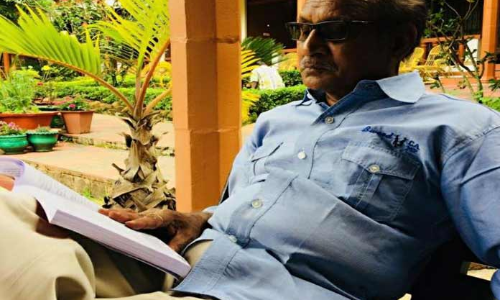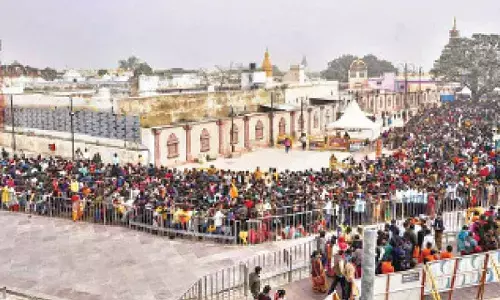Sarma’s Musing

Atreya Sarma Uppaluri dons many hats and all with aplomb He is a bookeditor, journaleditor, translator, essayist, poet and bookreviewer Currently, the Chief Editor of the Muse India ejournal wwwmuseindiacom, he has just been conferred the Shambhabi Samman 2019 for Outstanding Contribution To Literature given by Kolkatabased Hawakal Publishers
Atreya Sarma Uppaluri dons many hats and all with aplomb. He is a book-editor, journal-editor, translator, essayist, poet and book-reviewer. Currently, the Chief Editor of the Muse India e-journal (www.museindia.com), he has just been conferred the Shambhabi Samman 2019 for ‘Outstanding Contribution To Literature’ given by Kolkata-based Hawakal Publishers.
He smiles modestly when you congratulate him on this award: "I am happy and humbled to receive this recognition. However, I consider it more honour to the Goddess of Learning, Saraswati and to the very art of poetry than a personal one!"
This is not his first award. He has also received the Setu Award for Excellence 2017 conferred by the Pittsburgh based Setu, a monthly bilingual online journal.
Sarma's tryst with Muse India has been a decade-long one. He joined the team in 2009 and was Editor (Fiction) up to March-April 2017 issue; he handled its News and Events column also up to Sep 2017. Today, he continues to Editor (Reviews); and Contributing Editor for Telugu Literature.
He has donned the role of the editor several times. He was also the editor of Bharatiya Pragna monthly and Cyberhood weekly. He is also the official critic of Metverse Muse, an international journal of metrical poetry from Visakhapatnam; and is on the Advisory Board of Teesta: An International Journal of Poetry. As Contributing Editor (Telugu Literature), he has so far presented four exhaustive features on Telugu Literature in Muse India.
Sarma has composed, in English, the profiles of 132 modern Telugu stalwarts for a bilingual book ‘Marapuraani Maanikyaalu’ (2010) for which BNIM was the artist. Who were these achievers and what was the criterion? Sarma reveals: "The achievers were from different from walks of life who made a mark for themselves and left an indelible impression in the society; not living legends but personalities who were no more at the time of compiling the book. Among these were Cattamanchi Ramalinga Reddy, Basavaraju Appa Rao, Viswanatha Satyanarayana, Tapi Dharma Rao, Suravaram Pratapa Reddy, Pingali Nagendra Rao, SV Ranga Rao, and Damerla Rama Rao."
As an editor, Atreya Sarma has handled 11 books. Among these are ‘Celebrating Creativity: HLF 2010’ (An anthology of poems/ short stories by 76 writers); ‘Souvenir: HLF 2010’; ‘Lung Care and Long Life’ by Dr Shyam Sunder Raj (2012); ‘Memoirs & Musings of an IAS Officer’ by KV Natarajan, IAS (Retd) (Menaka Prakashan, 2013); ‘Turquoise Tulips’ (a collection of short stories) by the USA-based Dr Ashok Patwari (Authors Press 2015); and ‘Femininity: Poetic Endeavours’ (Authors Press, 2016).
Sarma's translation credits for Telugu into English include three major books, individual poems, short stories and articles. Noteworthy among these is his translation into English six out of 36 chapters of Jnanpith awardee Viswanatha Satyanarayana’s magnum-opus, the Telugu mega-novel ‘Veyi Padagalu’ titled ‘Thousand Hoods’, under the aegis of the Hyderabad-based Viswanatha Sahitee Peetham (2015).
His first collection of English poems, titled ‘Sunny Rain-n-Snow’ was published in 2016. He also contributed a column for years to The Hans India newspaper. In this weekly column called ‘Wordsmith’, he wrote about poets and poetry. He has also guest-edited a Feature ‘India @ 70’ for the August 2017 issue of Setu magazine.
A second book is in the pipeline. He lets us on about the subject but only just. "It will have an eclectic range of poems."
His academic credentials make for a long and intriguingly varied list— MA (English Litt), a PG Diploma (Mass Communications and Telugu Translation Techniques), a BA (English Litt, Sanskrit Litt, History) and BSc (Botany, Zoology, Chemistry), and CAIIB (Part I) with mid-level managerial experience in State Bank of India.
Degrees in literature and science and a career in a bank? When our curiosity was aroused, he explained: "When knowledge is considered a whole, each branch of learning is interconnected in one way or the other, and such knowledge will facilitate a broader understanding of things. Literature being all-encompassing, litterateurs come from all walks of life, including the banking sector. While in the bank I dealt with ledgers and customers, in the literary activity I focus on creative works and writers. Communication skill is, anyway, needed in either case."
Translation is a tough job. What are the challenges and pitfalls in translation? Sarma replies: "There are different issues. Prime among them are inadequate bilingual lexical and thesaurus tools, non-literal translation of native idioms, proverbs and culture-specific terms from the source to the target language, choice of the translation/trans-creation style, and being optimally faithful to the original are the challenges, or pitfalls or hitches, in my view."
What is his opinion on the state of Telugu poetry today? "The number of poets has gone up phenomenally; and the range of themes, approaches and perceptions are as diverse as the poets. However, there is a need for greater depth and objectivity, I feel. Many print and online journals are giving due space to poetry. There are many individuals and literary organisations who are promoting poetry by conducting competitions and awarding prizes. There is a lot of poetry that has a political shadow cast on it, according to the ideological proclivities of the poets concerned. If poets have to be statesmen or visionaries or seers, poetry has to be much broader and harmonising instead of sectarian and conflict-breeding... not just in Telugu but in any Indian language including English."
A conversation with Atreya Sarma can be very insightful indeed.














